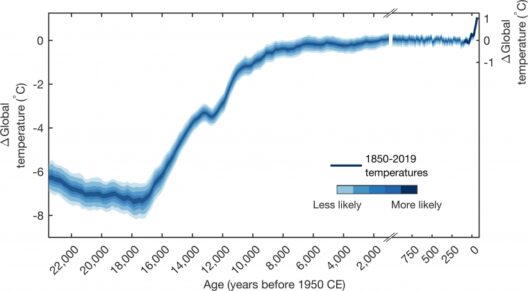Throughout history, the relationship between humans and their environment has been pivotal, shaping not only our societies but also the climate of our planet. A prevalent question emerges from this intricate relationship: Have humans always contributed to global warming? To address this inquiry effectively, it is essential to consider several key factors, beginning with the role of natural climate variability.
The Earth’s climate system is inherently dynamic, characterized by periodic oscillations and fluctuations. For instance, natural phenomena such as volcanic eruptions, solar irradiance variations, and oceanic currents have historically influenced climatic conditions. During the Holocene epoch, which commenced approximately 11,700 years ago, these natural fluctuations dictated periods of warmth and cold, long before anthropogenic factors came into play. However, understanding these natural changes does not absolve humanity from its influence on global temperatures.
Historically, anthropogenic activities began to impact the climate considerably during the Agricultural Revolution, approximately 10,000 years ago. As humans transitioned from nomadic lifestyles to settled agriculture, land use patterns changed markedly. Deforestation for farmland reduced carbon sinks, while the introduction of livestock led to increased methane emissions. Though these early activities contributed minimally to the global climate shift compared to modern practices, they marked the inception of humanity’s more direct involvement in climate alteration.
Advancements in technology and industrial practices during the last few centuries heralded a significant acceleration in humanity’s contribution to global warming. The Industrial Revolution in the late 18th century catalyzed an unprecedented era of greenhouse gas emissions. The combustion of fossil fuels such as coal and oil became the cornerstone of industry, drastically increasing carbon dioxide and other greenhouse gas concentrations in the atmosphere. This trend reached critical levels in the 20th century as nations expanded their industrial and agricultural paradigms.
Data from climate science indicates that since 1950, human activities have been unequivocally responsible for the observed increase in global temperatures. Studies reveal a correlation that cannot be ignored; as industrial activities climbed, so too did global temperatures. This correlation is attributed primarily to the excessive release of carbon dioxide and other greenhouse gases, primarily from burning fossil fuels, deforestation, and various industrial processes.
Moreover, the advent of our consumer-based society, which burgeoned in the post-World War II era, has compounded this issue. A culture of overconsumption, characterized by increased waste production and resource exploitation, resulted in further exacerbation of climate change. The global population surge, coupled with heightened economic activities, has created an environment where the climate is pushed beyond its natural limits. The ramifications are becoming increasingly palpable—not just in the form of rising sea levels or intensified weather patterns, but also in the delicate ecosystems that are now on the brink of collapse.
One must also consider the psychological aspects that contribute to humanity’s persistent contribution to climate change. A collective denial about the realities of global warming persists among various groups, often fueled by misinformation and skepticism about climate science. This cognitive dissonance not only impedes progressive actions but also fosters a false sense of security concerning the consequences of our actions. The emotional barriers to acknowledging climate change complicate collective efforts to address and mitigate its impact.
Importantly, the geopolitical dimensions of climate change cannot be overlooked. The uneven distribution of resources and wealth, along with historical and contemporary power dynamics, shapes how nations respond to climate challenges. Emerging economies and developed nations grapple with differing priorities regarding economic growth versus environmental stewardship. In many cases, those who contribute the least to greenhouse gas emissions bear the brunt of climate change’s consequences, highlighting the ethical dilemmas inherent in the current global landscape.
The fact remains that human contributions to global warming are not a recent phenomenon but rather a gradual intensification of our impact on the planet. The question of whether humans have always contributed to global warming necessitates a reflective look at both historical and contemporary actions. While early human activities had a modest effect, the escalating pace of industrialization and resource exploitation has forged a new chapter in this narrative.
Looking forward, it is imperative to adopt a multifaceted approach to combat these dire trends. Mitigation strategies must involve reducing carbon footprints through renewable energy adoption, enhancing energy efficiency, and reclaiming carbon through afforestation efforts. Education and awareness are equally critical in fostering a global culture that prioritizes sustainability over unchecked economic growth. Only through collaborative efforts can we hope to reverse the deleterious effects of our prolific contributions to global warming.
In conclusion, the journey of humanity’s contributions to climate change reflects a complex interplay of environmental, technological, and sociopolitical factors. It is a clarion call for immediate action—a challenge that must be met with urgency and resolve. To reclaim our planet’s climate from the precipice of disaster, we must acknowledge our historical role, learn from our past actions, and advocate for sustainable solutions that respect both our environment and future generations.








